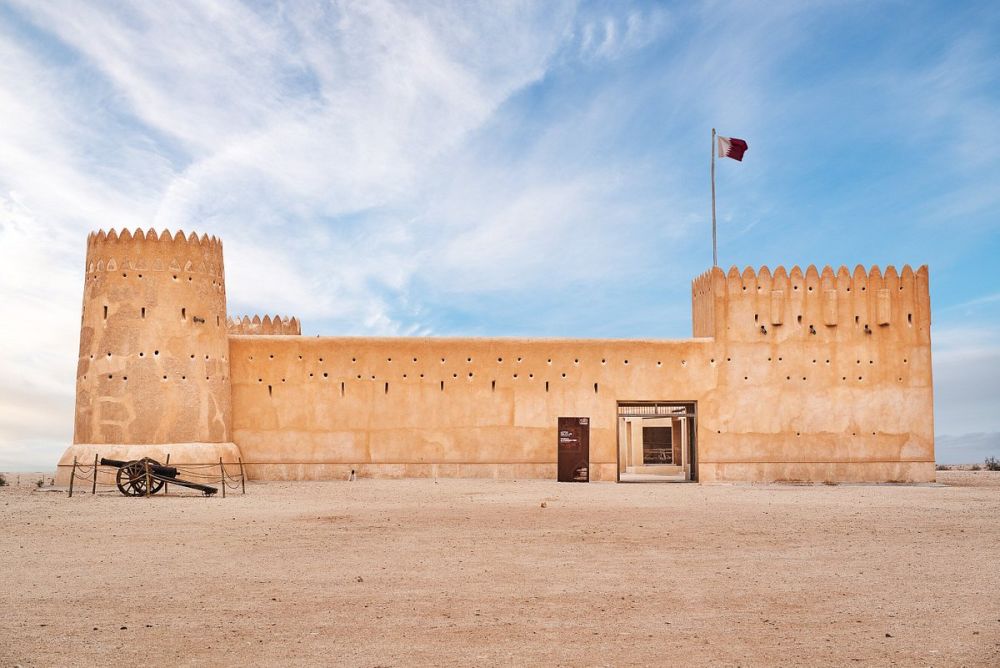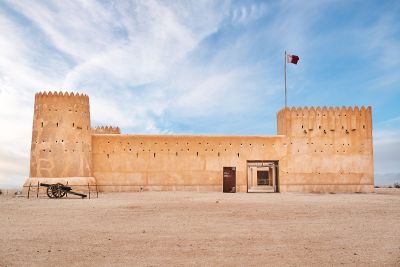

Al Zubarah Fort, a UNESCO World Heritage Site, offers a glimpse into Qatar's historical military prowess and its intriguing past. This rectangular-shaped fort, equipped with circular towers at three of its corners and one rectangular tower, was originally built for military purposes before it turned into a station for the coastal guards. A visit involves walking through its impressive walls made from mortar and compressed mud and peering into the past where pearls and fishing drove the economy. Inside the fort, you'll find an exhibit showcasing artifacts, archaeological findings, and displays informing you about the fort's history and the broader history of the Al Zubarah region, including the once flourishing pearl-diving industry. The mood within its walls is quiet yet powerful, standing as a monument to a bygone era.
Adjacent to the fort, Al Zubarah's Heritage Village is a reconstructed site that aims to give visitors a look at what traditional Qatari life would have been like in the 18th and 19th centuries. Explore the old residential palaces, houses, and restored mosques sprawled across this archaeological town. Immersing yourself in these reconstructions provides intimate context to Qatar's ancestors, demonstrating the intricacies of desert living, from weaving traditional baskets to utilizing resources like date palm trees that were integral to daily life. The surrounding ruined walls and hollow buildings are striking against the desert backdrop, provoking thoughts about life during bygone days, the people that walked these streets, and the history that unfolded here.
Delving deeper into the Al Zubarah Archaeological Site means traversing the expansive remains of what used to be a bustling pearl fishing and trading port dating back to the 18th century. It's a remarkable outdoor museum, offering up close encounters with the town's old merchant houses, mosque foundations, fisherman's huts, and streets that once echoed with day-to-day life. The site stands testament to the region's socioeconomic importance in the Persian Gulf and how communities adapted to the challenging environment. Though the ruins are mostly covered in sand, parts have been excavated, giving a unique perspective on the archeological methods used and the town's original structure.
For photography enthusiasts, Al Zubarah Fort and its surrounding landscapes present an exceptional subject. With the fort's intriguing architecture, intact walls and towers, and the vast expanses of desert that surround it, the site offers a perfect canvas for both amateur and professional photographers. Whether it's capturing the fort at the 'golden hour' when the sun casts enchanting shadows, shooting the contrast between the ancient walls and the bright blue sky, or documenting the intricate details of the ruins and recovered artifacts, photographers will find ample material here. For those interested in more structured experiences, photography workshops and tours can be arranged with local experts.
A short drive from the Al Zubarah Fort lies the vast expanse of the Qatari desert, where adventure seekers can embark on a thrilling desert safari. These excursions usually involve dune bashing—a ride over dunes in a 4WD vehicle that promises adventure and adrenaline. Tours may also include camel rides, sandboarding, and a traditional Bedouin-style meal in a desert camp. Gazing out the window during a desert safari offers views of endless dunes and the chance to spot wildlife like the oryx or camels in their natural habitat. End your day by watching the sunset over the desert, a once-in-a-lifetime experience not to be missed.
Immerse yourself in Qatari culture at Al Zubarah through educational workshops and experiences hosted by local artisans and historians. These workshops can range from practicing the art of Arabic calligraphy, learning about the techniques of traditional Qatari fishing and pearl diving, to discovering the process of making Qatari sweets and spices. These interactive sessions offer visitors a hands-on way to connect with the culture, customs, and traditions of the region, providing deeper insight into the lives of the people who lived in the archeological town of Al Zubarah and their descendants.
The Al Zubarah region is not only a historical treasure but also a haven for bird watchers. The area is part of an important bird migration route and is home to various species, including flamingos, herons, and ospreys. Guided bird watching tours are available, taking enthusiasts to the best spots for viewing these creatures in their natural habitats. During the cooler months, the region's unique ecosystem attracts a wide array of migratory birds, presenting an excellent opportunity for beginners and seasoned ornithologists alike to indulge in avian observation. Don’t forget your binoculars and bird guidebook to enhance the experience!
Fancy a bit of astronomy? The desert surrounding Al Zubarah Fort is an idyllic setting for stargazing. Away from the city lights, the darkness of the desert night unveils an awe-inspiring tapestry of stars, planets, and constellations. Visitors can join guided stargazing sessions where experts provide telescopes and share insights into the celestial bodies that adorn the night sky. These sessions offer a peaceful and educational evening under the stars. Learn to identify major constellations, spot planets, and hear tales and mythologies woven into the patterns above.
Explore the flavors of Qatar with a traditional cooking class that takes place near Al Zubarah Fort. Locals passionate about their culinary heritage lead these classes, showcasing how to prepare traditional Qatari dishes using time-honored techniques and local ingredients. Participants get the chance to cook, taste, and enjoy dishes such as Machboos (a fragrant rice and meat dish), Madrouba (a rice and chicken porridge), and Luqaimat (sweet dumplings) among others. It's a wonderful way to take a piece of Qatari culture home, learning to recreate the unique tastes and aromas of this rich cuisine.
When visiting Al Zubarah, don't miss the opportunity to explore the local artisan markets that occasionally pop up in the area. These markets are treasure troves of local handicrafts, artworks, textiles, and trinkets—perfect for finding unique gifts and souvenirs. Meet local artisans, learn about their crafts, and perhaps witness them in action as they create intricate jewelry, weave traditional fabrics, or carve wooden ornaments. The markets also often offer local foods and delicacies, providing a taste of Qatari hospitality.
